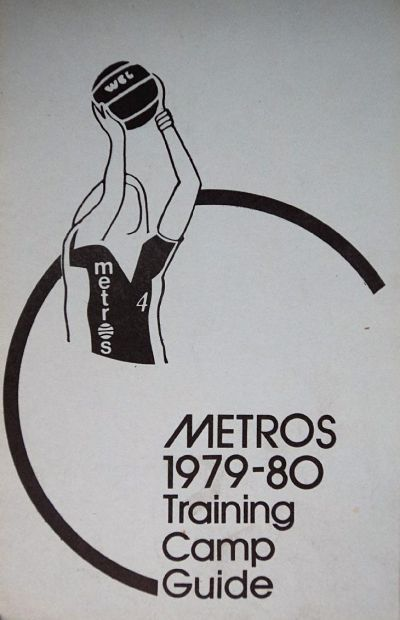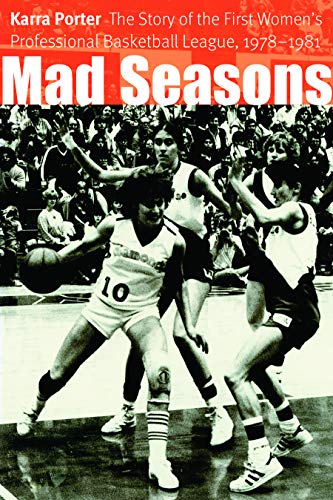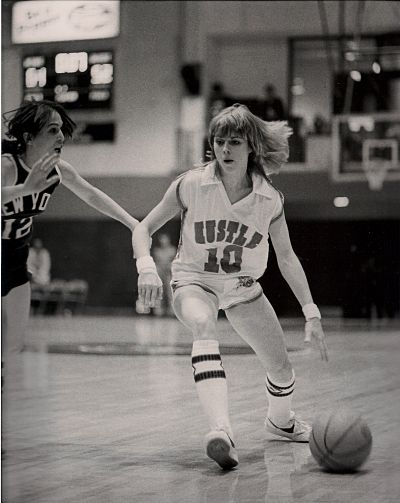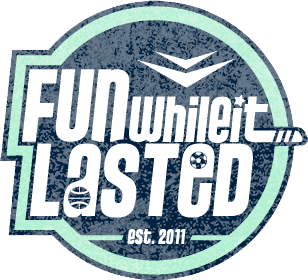Women’s Professional Basketball League (1979)
Tombstone
Born: June 1979 – WPBL expansion franchise
Folded: December 21, 1979
First Game: November 15, 1979 (L 94-73 vs. San Francisco Pioneers)
Last Game: December 18, 1979 (L 94-89 @ Milwaukee Does)
WBL Championships: None
Arena
Starplex Armory
Opened: 1941
Marketing
Team Colors: Red, White & Blue
Ownership
Owner: Apparently no one?
Editor's Pick
mad seasons
The Story of the First Women’s Professional Basketball League, 1978-1981
by Karra Porter
When you make a purchase through an affiliate link like this one, Fun While It Lasted earns a commission at no additional cost to you. Thanks for your support!
Background
I never thought we would find anything from the Washington Metros. But we unearthed this simple little training camp media guide (above) in Minnesota last week. God knows why anyone saved it, but I’m glad they did. You can download the whole thing here.
The Metros were a doomed expansion franchise in the Women’s Professional Basketball League (1978-1981) during the league’s second season in the fall/winter of 1979-80. It appears that the franchise was originally announced as an expansion team in June 1979. A guy named Jerry Lewis who owned some dry cleaning joints in Baltimore originally stepped forward as the lead investor. The original plan was for the Metros to split their games between the Baltimore Civic Center, the Starplex Armory in Washington, D.C. and the Capital Centre in Landover, Maryland.
Anyway, after the June 1979 announcement of the franchise, I can find no further mention of Lewis or his alleged investment group. Karra Porter, who compiled the definitive history of the WPBL in her 2006 book Mad Seasons: The Story of the First Women’s Professional Basketball League, makes no reference to Lewis and the entire Metros franchise earns only three mentions in the 274-page volume.
Financial Problems
In fact, it seems that the Metros went into the 1979-80 season without any ownership at all.
“I’m not really quite sure Washington ever had true ownership,” Chicago Hustle owner Sherwin Fischer told Skip Myslenski of The Chicago Tribune in 1981. “My opinion is they started a team and planned on using the money that would come in through the turnstiles.”
Porter relates several tales in her book about where the team derived its minimal funding – one exec says the league funneled $100,000 from other sources into the operation of the Metros. Founder and Commissioner Bill Byrne implies he ran the club on his personal credit cards after the original investors left him high and dry. Either way, the result was that the Metros players never received paychecks for the entire two month existence of the club.
Janie Fincher Trade
Two weeks into the season in late November 1979, the Metros acquired one of the league’s most popular players, Janie Fincher, in a trade with the Chicago Hustle. According to Porter’s book, the trade was a personal disaster for Fincher. The Hustle drew strong crowds, paid their players on time, and broadcast some games on WGN television. The attractive Fincher was the Hustle’s most popular player. Many Hustle fans wore black armbands to protest the trade. Fincher was packed off on a cross-country drive to join the Metros. She had to sneak out of a hotel in the middle of the night after learning the credit card provided for her travel expenses was no good.
But Fincher’s arrival was a relief to her new teammates. Her car was loaded with food, which the Metros had tremendous appetite for after two months without a paycheck. The team barely trained together, since players couldn’t afford gas to get to training. The Metros practiced on an outdoor tennis court in lieu of paying rent to an arena.
Collapse & Epilogue
The Washington Metros adventure ended after 10 games on December 21, 1979. The WPBL contracted the team in mid-season, along with another franchise in similarly desperate straits, the Philadelphia Fox. It was a mercy killing. The Metros’ players entered a dispersal draft, giving a select few the chance to stay in the league. Janie Fincher returned to Chicago, much to the delight of Hustle fans.
The WPBL never really recuperated from the collapse of the Washington Metros and Philadelphia Fox midway through the league’s second season. Even after this debacle, poorly vetted owners continued to infiltrate the league in Iowa, Milwaukee, New England and elsewhere. The league hobbled through one more season and folded in late 1981.
Downloads
1979-80 Washington Metros Training Camp Guide
1979-80 Washington Metros Training Camp Guide
Links
###




